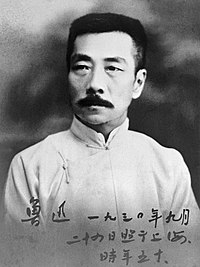Lu Xun
Lu Xun (Cina Tradisional: 魯迅, Cina Ringkas: 鲁迅, pinyin: Lǔ Xùn) atau Lu Hsün (Wade-Giles), merupakan nama samaran dari Zhou Shuren (Cina Tradisional: 周樹人; Cina Ringkas: 周树人; pinyin: Zhōu Shùrén; Wade-Giles: Chou Shu-jen) (9 Januari Ralat ungkapan: Pengendali > tidak dijangka bulan tidak sah) adalah seorang penulis terkemuka China dari abad ke-20. Ia dianggap oleh banyak sebagai pendiri sastera Cina, dia menulis di baihua (白话) (yang asli) serta Cina klasik. Lu Xun adalah seorang penulis cerpen, penyunting, penerjemah, pengkritik, penulis esei dan penyair. Pada 1930-an beliau menjadi ketua pada nama Liga China Penulis Sayap-Kiri di Shanghai.
Zhou Shuren | |
|---|---|
 | |
| Nama pena | Lu Xun |
| Pekerjaan | Penulis cereka, pengkritik, penulis esei |
| Tempoh | 1918-1936 |
Lu Xun's works exerted a very substantial influence after the May Fourth Movement to such a point that he was lionized by the Communist regime after 1949. Mao Zedong himself was a lifelong admirer of Lu Xun's works. Though sympathetic to the ideals of the Left, Lu Xun never actually joined the Chinese Communist Party. Lu Xun's works are known to English readers through numerous translations, especially Selected Stories of Lu Hsun translated by Yang Hsien-yi and Gladys Yang. Error: tiada nama laman disertakan (help).
Pekerjaan
suntingSyarahan
sunting"What Happens After Nora Leaves Home?" A Talk given at the Beijing Women's Normal College, December 26, 1923 Ding Ling and Lu Hsun, The Power of Weakness.' The Feminist Press (2007) 84-93
Cerita
sunting- from 《呐喊》 Call to Arms (1922)
- 狂人日记 "A Madman's Diary" (1918)
- 孔乙己 "Kong Yiji" (1919)
- 药 " Medicine" (1919)
- 明天 "Tomorrow" (1920)
- 一件小事 " An Incident" (1920)
- 头发的故事 "The Story of Hair" (1920)
- 风筝 "Kite" (1925)
- 风波 " Storm in a Teacup" (1920)
- 故乡 " Hometown" (1921)
- 阿Q正传 "The True Story of Ah Q" (1921)
- 端午节 "The Double Fifth Festival" (1922)
- 白光 "The White Light" (1922)
- 兔和猫 "The Rabbits and the Cat" (1922)
- 鸭的喜剧 "The Comedy of the Ducks" (1922)
- 社戏 " Village Opera" (1922)
- " New Year Sacrifice" (1924)
- from《彷徨》"Wandering"
- 祝福 Well Wishes(1924)
- 在酒楼上 In the Drinking House (1924)
- 幸福的家庭 A Happy Family (1924)
- 肥皂 Soap (1924)
- 长明灯 The Eternal Flame (1924)
- 示众 Public Exhibition (1925)
- 高老夫子 Old Mr. Gao (1925)
- 孤独者 Dictator (1925)
- 伤逝 Sadness
- 弟兄 Brothers
- 离婚 Divorce (1925)
- from《故事新编》"Old Tales Retold" (1935)
- 补天 Mending Heaven (1935)
- 奔月 The Flight to the Moon (1926)
- 理水 Curbing the Flood (1935)
- 采薇 Gathering Vetch (1935)
- 铸剑 Forging the Swords (1926)
- 出关 Going out (1935)
- 怀旧 Leaving the Pass (1935)
- 非攻 Opposing Aggression (1934)
- 起死 Resurrect the Dead (1935)
Karangan
sunting- 我之节烈观 My Views on Chastity (1918)
- 我们现在怎么做父亲 What is Required to be a Father Today (1919)
- Knowledge is a Crime (1919)
- 说胡须 My Moustache (1924)
- 看镜有感 Thoughts Before the Mirror (1925)
- On Deferring Fair Play (1925)
Koleksi
sunting- 《呐喊》 Call to Arms (Na han) (1923)
- 《彷徨》 Wondering (Pang huang) (1925)
- 《中国小说史略》 Brief History of Chinese Fiction (Zhongguo xiaoshuo shilüe) (1925) a substantial study of pre-modern Chinese literature
- 《故事新编》 Old Tales Retold (Gu shi xin bian) (1935)
- 《野草》 Wild Grass (Ye cao) (1927)
- 《朝花夕拾》 Dawn Blossoms Plucked at Dusk (Zhao hua xi shi)(1932) a collection of essays about his youth
Rujukan
suntingPautan luar
sunting| Wikipetik mempunyai koleksi petikan mengenai: Lu Xun |
| Wikimedia Commons mempunyai media berkaitan: Lu Xun. |
- Tim Gallaher's Lu Xun site, with extensive information and links to texts
- Lu Xun and other historical figures Diarkibkan 2007-02-19 di Wayback Machine
- Special Issue about Lu Xun (Jepun) at web.bureau.tohoku.ac.jp
- Lu Xun bibliography at mclc.osu.edu
- Pioneer of Modern Chinese Literature at www.coldbacon.com
- Lu Xun webpage (Cina)
- A Brief Biography of Lu Xun with Many Pictures
- Lu Xun and Japan(Jepun)
Terjemahan
sunting- Kong Yi Ji, Lu Hsun translated by SparklingEgnlish
- Reference Archive: Lu Xun (Lu Hsun) at www.marxists.org
- Selected Stories, Lu Hsun (1918-1926) at www.coldbacon.com
- An Outsider's Chats about Written Language, a long essay by Lu Xun on the difficulties of Chinese characters
- The Lyrical Lu Xun: a Study of his Classical-style Verse -- a book by Jon Eugene von Kowallis (Honolulu: University of Hawaii Press, 1996) -- includes a complete introduction to Lu Xun's poetry in the classical style, with Chinese characters, literal and verse translations, and a biographical introduction which summarizes his life in relation to his poetry.
{{#switch:||Kategori=